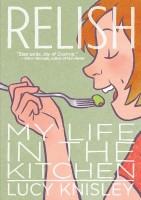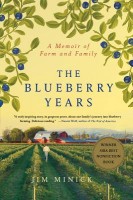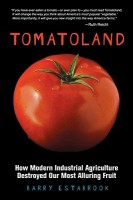Today’s guest post is from one of my dearest blogging (and thanks to blogging, in real life) friends, Leslie from Regular Rumination. This summer, Leslie has been taking on a project I really admire — growing a balcony garden at her apartment in New York City. She’s also been reading a lot about food and farming, the topic of today’s post. Please welcome Leslie to the blog!
Before this year, the only way I really could be close to gardening and growing food was reading books. Now that my boyfriend and I have our own garden balcony, though, my taste for nonfiction about food and growing food hasn’t changed. Here are just a few books that I’ve read that are my favorites. They’re all very different: from a memoir in comics about a passion for food, a memoir about a small, organic blueberry farm, and a long-form expose on the state of big tomato farms in the US.
Relish: My Life in the Kitchen by Lucy Knisley — This slim memoir told through comics will take you only a few hours to read, but it’s one that sticks with you. Relish is about Lucy’s love of food and where that came from: her parents and their friends. She worked in restaurants with her parents, worked on a farm and at a farmer’s market, and grew up to do the same. After each chapter, there is a quick recipe with illustrated instructions. Lucy’s love of food comes through on every page and it’s just such a wonderful book to read.
The Blueberry Years: A Memoir of Farm and Family by Jim Minick — Jim Minick and his wife knew that they wanted to change their lives. They were both burnt out teachers who were tired of the daily grind and frustrations of teaching, and they wanted a life that gave them more time to pursue all their interests. Jim’s family had a hobby blueberry farm in Pennsylvania, so Jim and Sarah quit their jobs and moved to a rural Virginia farm to cultivate a “Pick Your Own” blueberry farm.
This memoir, told in quick vignettes, is just a joy to read. You learn early on that at the time he wrote them memoir, Jim and Sarah no longer owned the farm. Seeing them go from wide-eyed, ambitious young farmers to slightly more jaded, experienced, and certainly still in love with the land farmers was a more realistic view than most of these “back to the land” memoirs present, and I appreciated its honesty. But it’s unfair to say that this book takes a bleak look at small, organic farming. It definitely does not. Minick is a lovely writer and I felt like I connected with him as an artist who is struggling to find a way to incorporate his art and his passion for the land.
Tomatoland: How Modern Industrial Agriculture Destroyed Our Most Alluring Fruit by Barry Estabrook — Tomatoes are one of my favorite foods, but it’s true that the tomatoes you buy in the grocery store, unless they’re organic/heirloom tomatoes, are mostly mealy and gross. No wonder so many people dislike tomatoes. But I’ve tasted some amazing tomatoes in my life and it’s possible to find them, but they aren’t coming from the big agricultural farms that are everywhere in Florida and California.
Tomatoland describes the history of the tomato and how we got to this point and also how tomatoes are grown in the US. It’s a horrifying look into how the tomato industry treats its workers, especially when it comes to pesticides that are affecting workers and neighbors who live around the farm. Those same workers often don’t have a way to accuse their employers because they are often undocumented and have to protection. Estabrook does a much better job revealing the, frankly, deadly dangers of buying a cheap tomato. It’s also a fascinating look at how to grow tomatoes across the spectrum: from small organic gardeners to the big agriculture. You’ll definitely know more after finishing this book than you did when you started!




Comments on this entry are closed.
I loooooved Relish, and I think I’d also adore The Blueberry Years. Our university runs a small, pick-your-own blueberry farm and the ag students use it for lessons. Even being able to relate in some small way can make a book so much more meaningful. Will be seeking this one out!
First of all, soooooo not surprised that Andi commented first on this! She’s a food book lover for sure! I’m actually going to start with Michael Polson’s books I think, since I borrowed a few from the library. Then I’ll go from there!
I’ve been meaning to get to Relish. Oh, and French Milk as well. I love me some graphic novels and I think I’ll save them both for the next 24 Hour Readathon 🙂
I loved Relish and Tomatoland (the latter of which *completely* changed by tomato consumption habits). I’ve never heard of The Blueberry Years, but it sounds like something I’d be totally into. 🙂
I loved The Blueberry Years too and could never figure out why it didn’t get more press. I’m glad to see it on this list!
How cool — I definitely want to check ALL of these out.
These sound so interesting, especially The Blueberry Years! Knowing it’s a story from the past — and that the authors no longer own the farm — definitely lends an air of intrigue and interest to the story. I love all food-related stories, so definitely must add these to my list!
Thanks for the great list! I finally have an apartment with a balcony and have been thinking of starting a balcony garden, but I’m a little worried about the time commitment. How much time do you typically spend on yours?
I’m really getting into books about food so I’ve bookmarked this for reference later. I think Tomatoland appeals to me most, I would have never thought books on a single bog standard item could be so interesting.
Oh no! It feels like the more we dig at every aspect of the food industry, the more horrible practices we uncover. Tomatoes too? Sounds like a great book though!